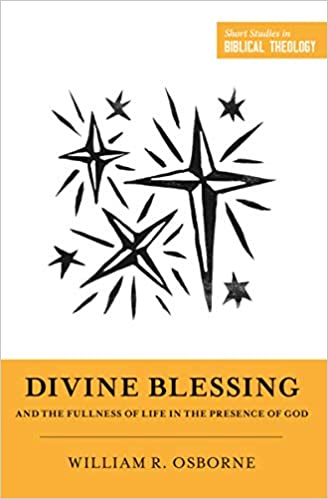A Book Review from Books At a Glance
by Dalton Bowser
What does it mean to be blessed? If you took a survey of ten random people on the street, you would probably get ten different answers. If you asked the same question to people in the church, you would likely get the same results. The reason is that the words ‘bless,’ ‘blessing,’ and ‘blessed’ are ambiguous and ill-defined terms today. Nevertheless, as biblical terms, Christians should care that they understand them properly. Thankfully, William Osborne, in his little book, Divine Blessing and the Fullness of Life in the Presence of God, seeks to unpack and to clarify for believers how the Bible defines blessing.
Osborne serves as associate professor of biblical and theological studies at College of the Ozarks and is the author or co-author of multiple books. His new book on divine blessing is part of the Short Studies in Biblical Theology series published by Crossway. His volume makes a valuable contribution to the series and to biblical theology in general.
Osborne states his purpose as “to establish a biblical-theological foundation of blessing by presenting a concise biblical theology that leans into how we view ourselves as living blessed lives as citizens of God’s kingdom” (16). He surveys both Old and New Testaments to discern what blessing means in Scripture. The theme of blessing develops throughout the Bible, but the concept remains essentially the same: “Diving blessing in the Bible is always physical and spiritual because it is fixed upon the reality of the fullness of life in the presence of God” (17). Blessing is neither merely physical or spiritual, but encompasses both as the blessed person experiences life in the presence of God.
Chapter one surveys the blessing theme in the early chapters of Genesis. God created a good world to be enjoyed by humanity, the capstone of His creation. God blessed His creation and desired prosperity for it. Mankind was to live in God’s presence in the garden and to experience fullness of life. However, they failed to take hold of this blessed life by sinning against God. And yet, this rebellion did not stop God from blessing mankind, which the rest of Genesis chronicles. Chapter 2 focuses mainly on the life of Abraham. God chose to bless him and promised that He would bless the world through him. Chapter 3 continues to trace the theme of blessing in the formation of the nation of Israel and the rest of the Old Testament. Central to blessing in the Old Testament was covenant obedience and living in the land that the Lord had given to His people.
The final two chapters cover the concept of blessing in the New Testament. Osborne argues, contrary to popular opinion, that the meaning of blessing does not drastically shift in the New Testament. Many people assume blessing in the Old Testament was physical, while blessing in the New Testament is spiritual. This is a false dichotomy: “The prosperity and well-being associated with the Old Testament portrayal of divine blessing is not presented as an end to be pursued. Unlike what is commonly heard in prosperity circles, you don’t go through God to get his blessings. Conversely, we might say you go through his blessing to get to God” (108). God has always been the end goal of all blessing in the Bible.
In the New Testament, Jesus inaugurates His kingdom which seeks to bring about a new creation that will restore mankind’s relationship with God. It is only when sin is dealt with that God’s full blessing can come on humanity. Sin is dealt with through the suffering of the Son of Man on the cross. Hence, there is a present paradox to divine blessing: Jesus brings blessing through suffering; therefore, at this stage, believers receive blessing through suffering: “We too will come to live out our lives knowing first the reality of the cross, and then experiencing the shared glory of our inheritance in the age to come” (131). Believers live in hope of the glory of the full blessing to come after this age of suffering. What is coming is a new heaven and a new earth where believers will experience the fullness of God’s blessing in His presence forever.
Divine Blessing and the Fullness of Life in the Presence of God is a helpful little book that clarifies the theme of blessing in Scripture. A few strengths are worth mentioning. First, in such a short space, Osborne provides a helpful biblical theology of divine blessing. His study brings insight and clarity to this important biblical theme. Second, this book helps to alleviate some confusion about blessing between the Old and New Testaments. He shows that the Old Testament is not merely about physical blessing at the expense of spiritual. Material possessions were always to be enjoyed in God’s presence and were not an end in themselves. Moreover, New Testament blessing is not merely spiritual.
The Old Testament material blessings anticipated the fullness of blessing that will be lived out as members in the kingdom of God. Finally, this book provides a helpful antidote against the prosperity gospel. Although not its main goal, if someone were to read this book, it would dismantle much distortion of blessing that is propagated in the prosperity gospel. One would see how the biblical concept of material blessing was always a means to get God. He is the ultimate blessing. In a short 138 pages, this book traces a theme that is often misunderstood today. Any Christian seeking clarity on this topic will be helped by reading it.
Dalton Bowser
The Southern Baptist Theological Seminary
